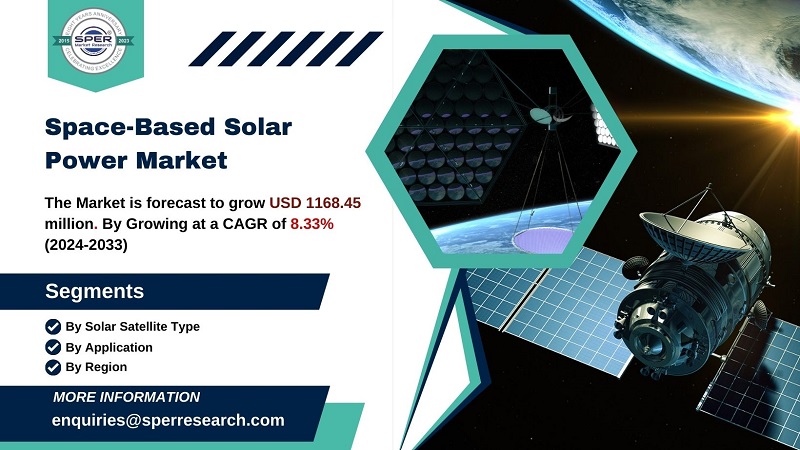The Concept of space-based solar power, or SBSP, is to capture solar energy and send it to Earth. Space-based solar power has several advantages, for instance, it does not release radioactive particles into space, contributes to the production of clean baseload power, and does not cool systems. Huge solar panels are installed in orbit, frequently in geostationary orbit (GEO), where they have constant solar radiation exposure. Sunlight is converted into power using these panels. After electricity is produced, it is transformed into a different energy type that may be transmitted, usually microwaves or lasers. Extremely focussed beams are utilized to direct the transformed energy toward Earth. The beam is received by a rectenna (rectifying antenna) on Earth, which transforms it back into electricity.
According to SPER Market Research, ‘Space-Based Solar Power Market Size- By Solar Satellite Type, By Application- Regional Outlook, Competitive Strategies and Segment Forecast to 2033’ states that the Space-Based Solar Power Market is estimated to reach USD 1168.45 million by 2033 with a CAGR of 8.33%.
Drivers:
The development of glass composites, a material used in wind turbines that has lower maintenance and installation costs because to technical developments, will help the market grow. The market for space-based solar power is expected to increase at a faster rate due to government laws that are intended to control environmental degradation. It is anticipated that government incentives will increase the market for space-based solar power by bringing down the cost of selected products. Therefore, the market for space-based solar power would have enormous prospects because to the favorable government rules and policies linked to greener energy projects and the reduction of carbon footprint.
Restraints:
Getting the public’s, regulatory agencies’, and governments’ support is essential. Both the environmental effects of space-based systems and the safety of microwave or laser transmission may raise questions. Systems that are based in space must be resilient enough to endure the hostile conditions there, such as radiation and micrometeoroids. Furthermore, upkeep and repairs in space are expensive and difficult. Other renewable energy sources, such as terrestrial solar and wind power, which are now more established and affordable, must compete with space-based solar power. Long-term projects include the development and implementation of solar power systems based in space. With regard to funding, technology, and market conditions, the longer schedule may present risks and uncertainties.
Request For Free Sample Report @ https://www.sperresearch.com/report-store/space-based-solar-power-market.aspx?sample=1
Covid Impact
Collaboration and coordination amongst research teams, manufacturers, and space agencies were hampered by the transition to remote work. While working remotely made it possible to continue making progress in some areas, it also presented difficulties when it came to doing intricate problem-solving and practical testing. Regulations pertaining to space-based technologies and the licensing procedures for space missions were delayed as a result of the pandemic’s impact on regulatory authorities and space organizations. Resilient and sustainable energy solutions were also emphasized. As a long-term solution to address global energy demands and climate change, this may spur increased interest in and investment in space-based solar power.
The US has made significant investments in space-based solar power technology research and development, which has led to North America’s dominance in the global space-based solar power market. Major players in the market are Airborne, Zur Space Solar Power GmbH, Fralock Holdings, Japan Aerospace Exploration Agency, Northrop Grumman, Borrego Energy, LLC, Solaren Corporation and Others.
Space-Based Solar Power Market Segmentation:
By Solar Satellite Type: Based on the Solar Satellite Type, Global Space-Based Solar Power Market is segmented as; Microwave Transmitting Solar Satellite and Laser Transmitting Solar Satellite.
By Application: Based on the Application, Global Space-Based Solar Power Market is segmented as; Electricity Generations and Space Applications.
By Region: This research also includes data for North America, Asia-Pacific, Latin America, Middle East & Africa and Europe.
For More Information, refer to below link: –
Space-Based Solar Power Market Forecast
Related Reports:
Contact Us:
Sara Lopes, Business Consultant – U.S.A.
enquiries@sperresearch.com
+1-347-460-2899



